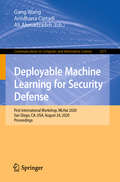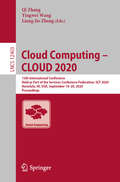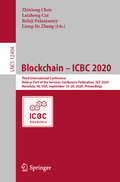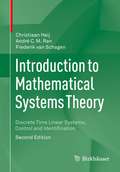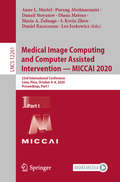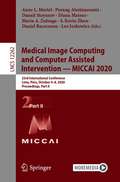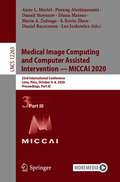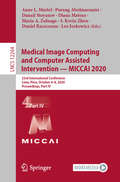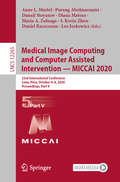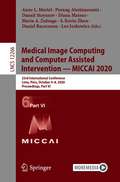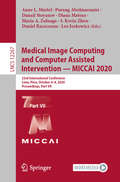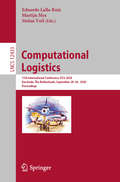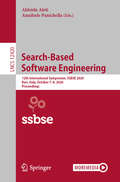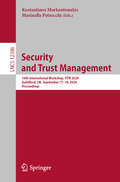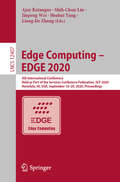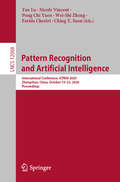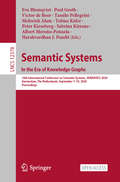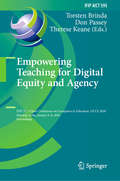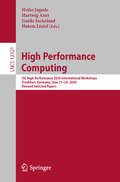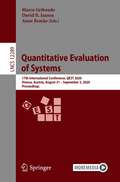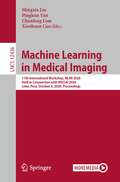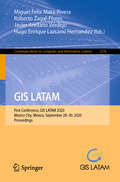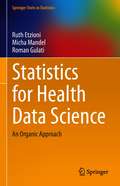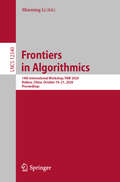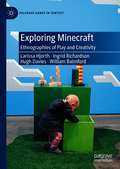- Table View
- List View
Deployable Machine Learning for Security Defense: First International Workshop, MLHat 2020, San Diego, CA, USA, August 24, 2020, Proceedings (Communications in Computer and Information Science #1271)
by Gang Wang Arridhana Ciptadi Ali AhmadzadehThis book constitutes selected papers from the First International Workshop on Deployable Machine Learning for Security Defense, MLHat 2020, held in August 2020. Due to the COVID-19 pandemic the conference was held online. The 8 full papers were thoroughly reviewed and selected from 13 qualified submissions. The papers are organized in the following topical sections: understanding the adversaries; adversarial ML for better security; threats on networks.
Cloud Computing – CLOUD 2020: 13th International Conference, Held as Part of the Services Conference Federation, SCF 2020, Honolulu, HI, USA, September 18-20, 2020, Proceedings (Lecture Notes in Computer Science #12403)
by Qi Zhang Yingwei Wang Liang-Jie ZhangThis book constitutes the proceedings of the 13th International Conference on Cloud Computing, CLOUD 2020, held as part of SCF 2020, during September 18-20, 2020. The conference was planned to take place in Honolulu, HI, USA and was changed to a virtual format due to the COVID-19 pandemic.The 16 full and 6 short papers presented were carefully reviewed and selected from 49 submissions. They deal with the latest fundamental advances in the state of the art and practice of cloud computing, identify emerging research topics, and define the future of cloud computing.
Blockchain – ICBC 2020: Third International Conference, Held as Part of the Services Conference Federation, SCF 2020, Honolulu, HI, USA, September 18-20, 2020, Proceedings (Lecture Notes in Computer Science #12404)
by Zhixiong Chen Laizhong Cui Balaji Palanisamy Liang-Jie ZhangThis book constitutes the proceedings of the Third International Conference on Blockchain, ICBC 2020, held as part of SCF 2020, during September 18-20, 2020. The conference was planned to take place in Honolulu, HI, USA and was changed to a virtual format due to the COVID-19 pandemic. The 14 full paper and 1 short paper presented were carefully reviewed and selected from 26 submissions. They deal with all topics regarding blockchain technologies, platforms, solutions and business models, including new blockchain architecture, platform constructions, blockchain development and blockchain services technologies as well as standards, and blockchain services innovation lifecycle including enterprise modeling, business consulting, solution creation, services orchestration, services optimization, services management, services marketing, business process integration and management.
Introduction to Mathematical Systems Theory: Discrete Time Linear Systems, Control and Identification
by Christiaan Heij André C.M. Ran Frederik van SchagenThis book provides an introduction to the theory of linear systems and control for students in business mathematics, econometrics, computer science, and engineering. The focus is on discrete time systems, which are the most relevant in business applications, as opposed to continuous time systems, requiring less mathematical preliminaries. The subjects treated are among the central topics of deterministic linear system theory: controllability, observability, realization theory, stability and stabilization by feedback, LQ-optimal control theory. Kalman filtering and LQC-control of stochastic systems are also discussed, as are modeling, time series analysis and model specification, along with model validation.This second edition has been updated and slightly expanded. In addition, supplementary material containing the exercises is now available on the Springer Link's book website.
Medical Image Computing and Computer Assisted Intervention – MICCAI 2020: 23rd International Conference, Lima, Peru, October 4–8, 2020, Proceedings, Part I (Lecture Notes in Computer Science #12261)
by Anne L. Martel Purang Abolmaesumi Danail Stoyanov Diana Mateus Maria A. Zuluaga S. Kevin Zhou Daniel Racoceanu Leo JoskowiczThe seven-volume set LNCS 12261, 12262, 12263, 12264, 12265, 12266, and 12267 constitutes the refereed proceedings of the 23rd International Conference on Medical Image Computing and Computer-Assisted Intervention, MICCAI 2020, held in Lima, Peru, in October 2020. The conference was held virtually due to the COVID-19 pandemic.The 542 revised full papers presented were carefully reviewed and selected from 1809 submissions in a double-blind review process. The papers are organized in the following topical sections: Part I: machine learning methodologies Part II: image reconstruction; prediction and diagnosis; cross-domain methods and reconstruction; domain adaptation; machine learning applications; generative adversarial networks Part III: CAI applications; image registration; instrumentation and surgical phase detection; navigation and visualization; ultrasound imaging; video image analysis Part IV: segmentation; shape models and landmark detection Part V: biological, optical, microscopic imaging; cell segmentation and stain normalization; histopathology image analysis; opthalmology Part VI: angiography and vessel analysis; breast imaging; colonoscopy; dermatology; fetal imaging; heart and lung imaging; musculoskeletal imaging Part VI: brain development and atlases; DWI and tractography; functional brain networks; neuroimaging; positron emission tomography
Medical Image Computing and Computer Assisted Intervention – MICCAI 2020: 23rd International Conference, Lima, Peru, October 4–8, 2020, Proceedings, Part II (Lecture Notes in Computer Science #12262)
by Leo Joskowicz Diana Mateus Maria A. Zuluaga Danail Stoyanov Daniel Racoceanu Purang Abolmaesumi Anne L. Martel S. Kevin ZhouThe seven-volume set LNCS 12261, 12262, 12263, 12264, 12265, 12266, and 12267 constitutes the refereed proceedings of the 23rd International Conference on Medical Image Computing and Computer-Assisted Intervention, MICCAI 2020, held in Lima, Peru, in October 2020. The conference was held virtually due to the COVID-19 pandemic.The 542 revised full papers presented were carefully reviewed and selected from 1809 submissions in a double-blind review process. The papers are organized in the following topical sections: Part I: machine learning methodologies Part II: image reconstruction; prediction and diagnosis; cross-domain methods and reconstruction; domain adaptation; machine learning applications; generative adversarial networks Part III: CAI applications; image registration; instrumentation and surgical phase detection; navigation and visualization; ultrasound imaging; video image analysis Part IV: segmentation; shape models and landmark detection Part V: biological, optical, microscopic imaging; cell segmentation and stain normalization; histopathology image analysis; opthalmology Part VI: angiography and vessel analysis; breast imaging; colonoscopy; dermatology; fetal imaging; heart and lung imaging; musculoskeletal imaging Part VI: brain development and atlases; DWI and tractography; functional brain networks; neuroimaging; positron emission tomography
Medical Image Computing and Computer Assisted Intervention – MICCAI 2020: 23rd International Conference, Lima, Peru, October 4–8, 2020, Proceedings, Part III (Lecture Notes in Computer Science #12263)
by Leo Joskowicz Diana Mateus Maria A. Zuluaga Danail Stoyanov Daniel Racoceanu Purang Abolmaesumi Anne L. Martel S. Kevin ZhouThe seven-volume set LNCS 12261, 12262, 12263, 12264, 12265, 12266, and 12267 constitutes the refereed proceedings of the 23rd International Conference on Medical Image Computing and Computer-Assisted Intervention, MICCAI 2020, held in Lima, Peru, in October 2020. The conference was held virtually due to the COVID-19 pandemic.The 542 revised full papers presented were carefully reviewed and selected from 1809 submissions in a double-blind review process. The papers are organized in the following topical sections: Part I: machine learning methodologies Part II: image reconstruction; prediction and diagnosis; cross-domain methods and reconstruction; domain adaptation; machine learning applications; generative adversarial networks Part III: CAI applications; image registration; instrumentation and surgical phase detection; navigation and visualization; ultrasound imaging; video image analysis Part IV: segmentation; shape models and landmark detection Part V: biological, optical, microscopic imaging; cell segmentation and stain normalization; histopathology image analysis; opthalmology Part VI: angiography and vessel analysis; breast imaging; colonoscopy; dermatology; fetal imaging; heart and lung imaging; musculoskeletal imaging Part VI: brain development and atlases; DWI and tractography; functional brain networks; neuroimaging; positron emission tomography
Medical Image Computing and Computer Assisted Intervention – MICCAI 2020: 23rd International Conference, Lima, Peru, October 4–8, 2020, Proceedings, Part IV (Lecture Notes in Computer Science #12264)
by Anne L. Martel Purang Abolmaesumi Danail Stoyanov Diana Mateus Maria A. Zuluaga S. Kevin Zhou Daniel Racoceanu Leo JoskowiczThe seven-volume set LNCS 12261, 12262, 12263, 12264, 12265, 12266, and 12267 constitutes the refereed proceedings of the 23rd International Conference on Medical Image Computing and Computer-Assisted Intervention, MICCAI 2020, held in Lima, Peru, in October 2020. The conference was held virtually due to the COVID-19 pandemic.The 542 revised full papers presented were carefully reviewed and selected from 1809 submissions in a double-blind review process. The papers are organized in the following topical sections: Part I: machine learning methodologies Part II: image reconstruction; prediction and diagnosis; cross-domain methods and reconstruction; domain adaptation; machine learning applications; generative adversarial networks Part III: CAI applications; image registration; instrumentation and surgical phase detection; navigation and visualization; ultrasound imaging; video image analysis Part IV: segmentation; shape models and landmark detection Part V: biological, optical, microscopic imaging; cell segmentation and stain normalization; histopathology image analysis; opthalmology Part VI: angiography and vessel analysis; breast imaging; colonoscopy; dermatology; fetal imaging; heart and lung imaging; musculoskeletal imaging Part VI: brain development and atlases; DWI and tractography; functional brain networks; neuroimaging; positron emission tomography
Medical Image Computing and Computer Assisted Intervention – MICCAI 2020: 23rd International Conference, Lima, Peru, October 4–8, 2020, Proceedings, Part V (Lecture Notes in Computer Science #12265)
by Anne L. Martel Purang Abolmaesumi Danail Stoyanov Diana Mateus Maria A. Zuluaga S. Kevin Zhou Daniel Racoceanu Leo JoskowiczThe seven-volume set LNCS 12261, 12262, 12263, 12264, 12265, 12266, and 12267 constitutes the refereed proceedings of the 23rd International Conference on Medical Image Computing and Computer-Assisted Intervention, MICCAI 2020, held in Lima, Peru, in October 2020. The conference was held virtually due to the COVID-19 pandemic. The 542 revised full papers presented were carefully reviewed and selected from 1809 submissions in a double-blind review process. The papers are organized in the following topical sections: Part I: machine learning methodologies Part II: image reconstruction; prediction and diagnosis; cross-domain methods and reconstruction; domain adaptation; machine learning applications; generative adversarial networks Part III: CAI applications; image registration; instrumentation and surgical phase detection; navigation and visualization; ultrasound imaging; video image analysis Part IV: segmentation; shape models and landmark detection Part V: biological, optical, microscopic imaging; cell segmentation and stain normalization; histopathology image analysis; opthalmology Part VI: angiography and vessel analysis; breast imaging; colonoscopy; dermatology; fetal imaging; heart and lung imaging; musculoskeletal imaging Part VI: brain development and atlases; DWI and tractography; functional brain networks; neuroimaging; positron emission tomography
Medical Image Computing and Computer Assisted Intervention – MICCAI 2020: 23rd International Conference, Lima, Peru, October 4–8, 2020, Proceedings, Part VI (Lecture Notes in Computer Science #12266)
by Leo Joskowicz Diana Mateus Maria A. Zuluaga Danail Stoyanov Daniel Racoceanu Purang Abolmaesumi Anne L. Martel S. Kevin ZhouThe seven-volume set LNCS 12261, 12262, 12263, 12264, 12265, 12266, and 12267 constitutes the refereed proceedings of the 23rd International Conference on Medical Image Computing and Computer-Assisted Intervention, MICCAI 2020, held in Lima, Peru, in October 2020. The conference was held virtually due to the COVID-19 pandemic. The 542 revised full papers presented were carefully reviewed and selected from 1809 submissions in a double-blind review process. The papers are organized in the following topical sections: Part I: machine learning methodologies Part II: image reconstruction; prediction and diagnosis; cross-domain methods and reconstruction; domain adaptation; machine learning applications; generative adversarial networks Part III: CAI applications; image registration; instrumentation and surgical phase detection; navigation and visualization; ultrasound imaging; video image analysis Part IV: segmentation; shape models and landmark detection Part V: biological, optical, microscopic imaging; cell segmentation and stain normalization; histopathology image analysis; opthalmology Part VI: angiography and vessel analysis; breast imaging; colonoscopy; dermatology; fetal imaging; heart and lung imaging; musculoskeletal imaging Part VI: brain development and atlases; DWI and tractography; functional brain networks; neuroimaging; positron emission tomography
Medical Image Computing and Computer Assisted Intervention – MICCAI 2020: 23rd International Conference, Lima, Peru, October 4–8, 2020, Proceedings, Part VII (Lecture Notes in Computer Science #12267)
by Leo Joskowicz Diana Mateus Maria A. Zuluaga Danail Stoyanov Daniel Racoceanu Purang Abolmaesumi Anne L. Martel S. Kevin ZhouThe seven-volume set LNCS 12261, 12262, 12263, 12264, 12265, 12266, and 12267 constitutes the refereed proceedings of the 23rd International Conference on Medical Image Computing and Computer-Assisted Intervention, MICCAI 2020, held in Lima, Peru, in October 2020. The conference was held virtually due to the COVID-19 pandemic. The 542 revised full papers presented were carefully reviewed and selected from 1809 submissions in a double-blind review process. The papers are organized in the following topical sections: Part I: machine learning methodologies Part II: image reconstruction; prediction and diagnosis; cross-domain methods and reconstruction; domain adaptation; machine learning applications; generative adversarial networks Part III: CAI applications; image registration; instrumentation and surgical phase detection; navigation and visualization; ultrasound imaging; video image analysis Part IV: segmentation; shape models and landmark detection Part V: biological, optical, microscopic imaging; cell segmentation and stain normalization; histopathology image analysis; opthalmology Part VI: angiography and vessel analysis; breast imaging; colonoscopy; dermatology; fetal imaging; heart and lung imaging; musculoskeletal imaging Part VI: brain development and atlases; DWI and tractography; functional brain networks; neuroimaging; positron emission tomography
Computational Logistics: 11th International Conference, ICCL 2020, Enschede, The Netherlands, September 28–30, 2020, Proceedings (Lecture Notes in Computer Science #12433)
by Stefan Voß Eduardo Lalla-Ruiz Martijn MesThis book constitutes the proceedings of the 11th International Conference on Computational Logistics, ICCL 2020, held in Enschede, The Netherlands, in September 2020.The 49 papers included in this book were carefully reviewed and selected from 73 submissions. They were organized in topical sections named: maritime and port logistics; vehicle routing and scheduling; freight distribution and city logistics; network design and scheduling; and selected topics in logistics.Due to the Corona pandemic ICCL 2020 was held as a virtual event.
Search-Based Software Engineering: 12th International Symposium, SSBSE 2020, Bari, Italy, October 7–8, 2020, Proceedings (Lecture Notes in Computer Science #12420)
by Aldeida Aleti Annibale PanichellaThis book constitutes the refereed proceedings of the 12th International Symposium on Search-Based Software Engineering, SSBSE 2020, held in Bari, Italy, in October 2020. The 13 research papers and 5 short papers presented together with 1 keynote were carefully reviewed and selected from 34 submissions. SBSE is a research area focused on the formulation of software engineering problems as search problems, and the subsequent use of complex heuristic techniques to attain optimal solutions to such problems. A wealth of engineering challenges - from test generation, to design refactoring, to process organization - can be solved efficiently through the application of automated optimization techniques. SBSE is a growing field - sitting at the crossroads between AI, machine learning, and software engineering - and SBSE techniques have begun to attain human-competitive results. Due to the Corona pandemic SSBSE 2020 was held as a virtual event.
Security and Trust Management: 16th International Workshop, STM 2020, Guildford, UK, September 17–18, 2020, Proceedings (Lecture Notes in Computer Science #12386)
by Kostantinos Markantonakis Marinella PetrocchiThis book constitutes the proceedings of the 16th International Workshop on Security and Trust Management, STM 2020, co-located with the 25th European Symposium on Research in Computer Security, ESORICS 2020. The conference was planned to take place in Guildford, UK, but had to be moved to an online format due to the COVID-19 pandemic. The workshop took place during September 17-18, 2020. The 8 papers presented in this volume were carefully reviewed and selected from 20 submissions. They were organized in topical sections on security properties and attacks; confidentiality schema and security processes.
Edge Computing – EDGE 2020: 4th International Conference, Held as Part of the Services Conference Federation, SCF 2020, Honolulu, HI, USA, September 18-20, 2020, Proceedings (Lecture Notes in Computer Science #12407)
by Liang-Jie Zhang Jinpeng Wei Ajay Katangur Shih-Chun Lin Shuhui YangThis book constitutes the proceedings of the International Conference on Edge Computing, EDGE 2020, held virtually as part of SCF 2020, in Honolulu, HI, USA, in September 2020. The 7 full and 2 short papers presented in this volume were carefully reviewed and selected from 13 submissions.The conference proceeding EDGE 2020 presents the latest fundamental advances in the state of the art and practice of edge computing, identify emerging research topics, and define the future of edge computing.
Pattern Recognition and Artificial Intelligence: International Conference, ICPRAI 2020, Zhongshan, China, October 19–23, 2020, Proceedings (Lecture Notes in Computer Science #12068)
by Yue Lu Nicole Vincent Pong Chi Yuen Wei-Shi Zheng Farida Cheriet Ching Y. SuenThis book constitutes the proceedings of the Second International Conference on Pattern Recognition and Artificial Intelligence, ICPRAI 2020, which took place in Zhongshan, China, in October 2020. The 49 full and 14 short papers presented were carefully reviewed and selected for inclusion in the book. The papers were organized in topical sections as follows: handwriting and text processing; features and classifiers; deep learning; computer vision and image processing; medical imaging and applications; and forensic studies and medical diagnosis.
Semantic Systems. In the Era of Knowledge Graphs: 16th International Conference on Semantic Systems, SEMANTiCS 2020, Amsterdam, The Netherlands, September 7–10, 2020, Proceedings (Lecture Notes in Computer Science #12378)
by Eva Blomqvist Paul Groth Victor De Boer Tassilo Pellegrini Mehwish Alam Tobias Käfer Peter Kieseberg Sabrina Kirrane Albert Meroño-Peñuela Harshvardhan J. PanditThis open access book constitutes the refereed proceedings of the 16th International Conference on Semantic Systems, SEMANTiCS 2020, held in Amsterdam, The Netherlands, in September 2020. The conference was held virtually due to the COVID-19 pandemic.
Empowering Teaching for Digital Equity and Agency: IFIP TC 3 Open Conference on Computers in Education, OCCE 2020, Mumbai, India, January 6–8, 2020, Proceedings (IFIP Advances in Information and Communication Technology #595)
by Torsten Brinda Don Passey Therese KeaneThis book constitutes the refereed post-conference proceedings of the IFIP TC 3 Open Conference on Computers in Education, OCCE 2020, held in Mumbai, India, in January 2020. The 11 full papers and 4 short papers included in this volume were carefully reviewed and selected from 57 submissions. The papers discuss key emerging topics and evolving practices in the area of educational computing research. They are organized in the following topical sections: computing education; learners’ and teachers’ perspectives; teacher professional development; the industry perspective; and further aspects.
High Performance Computing: ISC High Performance 2020 International Workshops, Frankfurt, Germany, June 21–25, 2020, Revised Selected Papers (Lecture Notes in Computer Science #12321)
by Heike Jagode Hartwig Anzt Guido Juckeland Hatem LtaiefThis book constitutes the refereed post-conference proceedings of 10 workshops held at the 35th International ISC High Performance 2020 Conference, in Frankfurt, Germany, in June 2020: First Workshop on Compiler-assisted Correctness Checking and Performance Optimization for HPC (C3PO); First International Workshop on the Application of Machine Learning Techniques to Computational Fluid Dynamics Simulations and Analysis (CFDML); HPC I/O in the Data Center Workshop (HPC-IODC); First Workshop \Machine Learning on HPC Systems" (MLHPCS); First International Workshop on Monitoring and Data Analytics (MODA); 15th Workshop on Virtualization in High-Performance Cloud Computing (VHPC). The 25 full papers included in this volume were carefully reviewed and selected. They cover all aspects of research, development, and application of large-scale, high performance experimental and commercial systems. Topics include high-performance computing (HPC), computer architecture and hardware, programming models, system software, performance analysis and modeling, compiler analysis and optimization techniques, software sustainability, scientific applications, deep learning.
Quantitative Evaluation of Systems: 17th International Conference, QEST 2020, Vienna, Austria, August 31 – September 3, 2020, Proceedings (Lecture Notes in Computer Science #12289)
by Marco Gribaudo Anne Remke David N. JansenThis book constitutes the proceedings of the 17th International Conference on Quantitative Evaluation Systems, QEST 2020, held in Vienna, Austria, in August/September 2020. The 12 full papers presented together with 7 short papers were carefully reviewed and selected from 42 submissions. The papers cover topics such as classic measures involving performance and reliability, quantification of properties that are classically qualitative, such as safety, correctness, and security as well as analytic studies, diversity in the model formalisms and methodologies employed, and development of new formalisms and methodologies.
Machine Learning in Medical Imaging: 11th International Workshop, MLMI 2020, Held in Conjunction with MICCAI 2020, Lima, Peru, October 4, 2020, Proceedings (Lecture Notes in Computer Science #12436)
by Mingxia Liu Pingkun Yan Chunfeng Lian Xiaohuan CaoThis book constitutes the proceedings of the 11th International Workshop on Machine Learning in Medical Imaging, MLMI 2020, held in conjunction with MICCAI 2020, in Lima, Peru, in October 2020. The conference was held virtually due to the COVID-19 pandemic. The 68 papers presented in this volume were carefully reviewed and selected from 101 submissions. They focus on major trends and challenges in the above-mentioned area, aiming to identify new-cutting-edge techniques and their uses in medical imaging. Topics dealt with are: deep learning, generative adversarial learning, ensemble learning, sparse learning, multi-task learning, multi-view learning, manifold learning, and reinforcement learning, with their applications to medical image analysis, computer-aided detection and diagnosis, multi-modality fusion, image reconstruction, image retrieval, cellular image analysis, molecular imaging, digital pathology, etc.
GIS LATAM: First Conference, GIS LATAM 2020, Mexico City, Mexico, September 28–30, 2020, Proceedings (Communications in Computer and Information Science #1276)
by Miguel Felix Mata-Rivera Roberto Zagal-Flores Javier Arellano Verdejo Hugo Enrique Lazcano HernandezThis book constitutes the refereed proceedings of the First GIS LATAM Conference, GIS LATAM 2020, held in September 2020. Due to the COVID-19 pandemic the conference was held online. The 9 full papers and 2 short papers were thoroughly reviewed and selected from 29 submissions. The papers are focused on the GIS applications in data analytics in spheres of health, environment, government, public, and education.
Statistics for Health Data Science: An Organic Approach (Springer Texts in Statistics)
by Ruth Etzioni Micha Mandel Roman GulatiStudents and researchers in the health sciences are faced with greater opportunity and challenge than ever before. The opportunity stems from the explosion in publicly available data that simultaneously informs and inspires new avenues of investigation. The challenge is that the analytic tools required go far beyond the standard methods and models of basic statistics. This textbook aims to equip health care researchers with the most important elements of a modern health analytics toolkit, drawing from the fields of statistics, health econometrics, and data science. This textbook is designed to overcome students’ anxiety about data and statistics and to help them to become confident users of appropriate analytic methods for health care research studies. Methods are presented organically, with new material building naturally on what has come before. Each technique is motivated by a topical research question, explained in non-technical terms, and accompanied by engaging explanations and examples. In this way, the authors cultivate a deep (“organic”) understanding of a range of analytic techniques, their assumptions and data requirements, and their advantages and limitations. They illustrate all lessons via analyses of real data from a variety of publicly available databases, addressing relevant research questions and comparing findings to those of published studies. Ultimately, this textbook is designed to cultivate health services researchers that are thoughtful and well informed about health data science, rather than data analysts. This textbook differs from the competition in its unique blend of methods and its determination to ensure that readers gain an understanding of how, when, and why to apply them. It provides the public health researcher with a way to think analytically about scientific questions, and it offers well-founded guidance for pairing data with methods for valid analysis. Readers should feel emboldened to tackle analysis of real public datasets using traditional statistical models, health econometrics methods, and even predictive algorithms. Accompanying code and data sets are provided in an author site: https://roman-gulati.github.io/statistics-for-health-data-science/
Frontiers in Algorithmics: 14th International Workshop, FAW 2020, Haikou, China, October 19-21, 2020, Proceedings (Lecture Notes in Computer Science #12340)
by Minming LiThis book constitutes the proceedings of the 14th International Workshop on Frontiers in Algorithmics, FAW 2020, held in Haikou, China, in May 2020. The conference was held virtually due to the COVID-19 pandemic. The 12 full papers presented in this volume were carefully reviewed and selected from 15 submissions. The workshop provides a focused forum on current trends of research on algorithms, discrete structures, and their applications, and brings together international experts at the research frontiers in these areas to exchange ideas and to present significant new results. The papers detail graph theory, scheduling and algorithm and complexity.
Exploring Minecraft: Ethnographies of Play and Creativity (Palgrave Games in Context)
by Larissa Hjorth Ingrid Richardson Hugh Davies William BalmfordThis book directs critical attention to one of the most ubiquitous and yet under-analyzed games, Minecraft. Drawing on three years of ethnographic fieldwork into mobile games in Australian homes, the authors seek to take Minecraft seriously as a cultural practice. The book examines how Minecraft players engage in a form of gameplay that is uniquely intergenerational, creative, and playful, and which moves ambivalently throughout everyday life. At the intersection of digital media, quotidian literacy, and ethnography, the book situates interdisciplinary debates around mundane play through the lens of Minecraft. Ultimately, Exploring Minecraft seeks to coalesce the discussion between formal and informal learning, fostering new forms of digital media creativity and ethnographic innovation around the analysis of games in everyday life.
